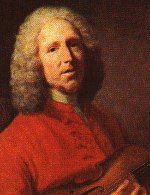|
Xtend
 Listen
Listen
 Period
Period
 Country
Country
 Notes
Notes
 Quotation
Quotation
 Dictionary
Dictionary
 Projects
Projects
 Finders
Finders
|
Born: 25 September
1683, Dijon, France
Died: 12 September 1764, Paris, France
 Rameau,
Jean-Philippe Rameau,
Jean-Philippe
His father wanted him to become a lawyer, but he chose
music, and when he was 18 he went away for his musical schooling in Milan .
He became a church organist .
He became a church organist in Clermont cathedral, and began writing harpsichord
in Clermont cathedral, and began writing harpsichord music
music  .
He published a book titled "Traite de l'Harmonie"
(Treatise on Harmony), that talks of the theory of harmony .
He published a book titled "Traite de l'Harmonie"
(Treatise on Harmony), that talks of the theory of harmony ,
in which he orderly formulated his concept of harmony, saying harmony consists
of a limited number of chords ,
in which he orderly formulated his concept of harmony, saying harmony consists
of a limited number of chords ,
built of thirds, appearing in their different
inversions and so on. His book provoked a
controversy, but he continued a discourse with his opponents all his life,
and publish additional books, in which he elaborated on his system. ,
built of thirds, appearing in their different
inversions and so on. His book provoked a
controversy, but he continued a discourse with his opponents all his life,
and publish additional books, in which he elaborated on his system.
At a later age, he started writing
operas ,
and was very successful ,
and was very successful in Paris
in Paris ,
with "Castor and Polux" ("Castor
et Polux") and "The Noble
Hindus" ("Les Nobles Hindu").
He used daring harmonies, and in his life he was
viewed as Lully's ,
with "Castor and Polux" ("Castor
et Polux") and "The Noble
Hindus" ("Les Nobles Hindu").
He used daring harmonies, and in his life he was
viewed as Lully's successor, as the greatest of French
successor, as the greatest of French Opera writers, in particular after
the death of Couperin
Opera writers, in particular after
the death of Couperin in 1733.
in 1733.


Rameau on the WWW
 Sites
Sites
|
 Audio
Audio
|
 Video
Video
|
 Images
Images
|
 MIDI
MIDI
|
|
Description
He played

and the

He Lived in the
 Baroque
Baroque
In
 France
France
|